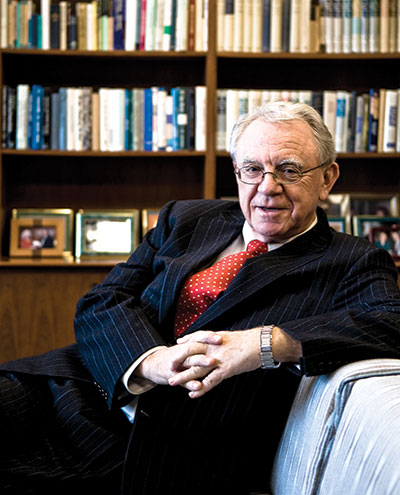Herbert Pardes, Past APA President, NIMH Director, Dies
Abstract
During a long career that featured accomplishments such as leading NewYork-Presbyterian Hospital following the merger of those two health systems, Pardes stayed humble and focused on the human side of patient care.
Phrases like “a giant in the field” and a “towering figure” may be overused, but psychiatry did recently lose a titan with the passing of Herbert Pardes, M.D., in April. Pardes, a past APA president (1989-1990) and former director of the National Institute of Mental Health (1978-1984), was 89.

For many, Pardes’ defining legacy may be his tenure as president and CEO of NewYork-Presbyterian Hospital from 2000 to 2011. Pardes was brought in shortly after the New York Hospital and Presbyterian Hospital merged to form one of the largest health care systems in the country, a system that includes two top medical centers (Weill Cornell Medical Center and Columbia University Medical Center). Pardes worked to make the new center more efficient but also a place that emphasized humanistic care.
The patient-centric focus arose from Pardes’ own negative hospital experience when he was treated for Perthes disease—a rare condition in which the blood supply to the hip joint is temporarily blocked—as a child. The humanist mindset followed Pardes throughout his professional career, including his time leading NIMH.
“During his tenure as NIMH director, Dr. Herbert Pardes helped usher the institute into a new era centered on advancing our understanding of mental illnesses through basic and behavioral research. His efforts laid the foundation for the diverse and rigorous research portfolio that NIMH supports today across its extramural and intramural programs,” said current—though outgoing—NIMH Director Joshua Gordon, M.D., Ph.D. “Dr. Pardes will be remembered for his commitment to excellent science; his support for the next generation of researchers and clinicians; and his dedication to serving individuals, families, and communities impacted by mental illness.”
(Gordon, incidentally, will be taking over as chair of the Department of Psychiatry at Columbia University, the position Pardes held before becoming CEO of NewYork-Presbyterian.)
“Herb was a wonderful role model, and he always had time to listen and offer advice,” echoed Elissa Benedek, M.D., who succeeded Pardes as APA president in 1990. “The thing about Herb is he was straightforward; he called things the way he saw them and maybe his suggestion was something you didn’t want to hear. But he was inclusive at a time when many others in the field were not, and he valued everyone’s opinion when making decisions.”

It is not surprising then, that the central theme of Pardes’ presidential year was strengthening APA’s ties with mental health advocacy groups. “These groups represent our friends, neighbors—sometimes our own families—and others who have been touched, in some way, by the devastating effects of mental illness,” he wrote in his final Psychiatric News presidential column. “They have a driving, personal interest in fighting stigma, securing government money for badly needed research and services, and working toward equity in third party coverage of mental illness.”
One of those groups was a nascent organization known as the National Alliance for Research on Schizophrenia and Depression, which Pardes helped grow into today’s Brain & Behavior Research Foundation (BBRF), the largest private supporter of mental health research in the country; Pardes was the founder and president of the BBRF Scientific Council. In 2014, the BBRF created a new award—the Pardes Humanitarian Prize—to recognize Pardes’ efforts toward achieving mental health parity and eliminating the stigma associated with mental illness and substance use.
“Dr. Pardes’ impact on the field of psychiatry is unparalleled. He played leadership roles in psychiatric care, neuroscience research, medical education, and health care policy,” said BBRF President and CEO Jeffrey Borenstein, M.D. “He believed it was vital to encourage and support talented scientists in their work to expand the frontiers of neuropsychiatric research. We are fortunate and blessed to have such a wonderful leader, role model, and friend. He will be dearly missed by all of us.” ■
Resource
Herb Pardes’ final APA presidential column. The column starts on page 3.



